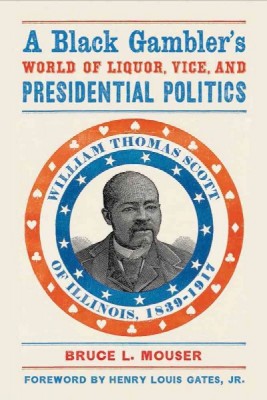| A Black Gambleras World of Liquor, Vice, and Presidential Politics: William Thomas Scott of Illinois, 1839a 1917 Contributor(s): Mouser, Bruce L. (Author), Gates, Henry Louis (Foreword by) |
|
 |
ISBN: 0299301842 ISBN-13: 9780299301842 Publisher: University of Wisconsin Press OUR PRICE: $22.46 Product Type: Paperback - Other Formats Published: October 2014 |
| Additional Information |
| BISAC Categories: - Biography & Autobiography | Political - Biography & Autobiography | Cultural, Ethnic & Regional - General - Biography & Autobiography | Historical |
| Dewey: B |
| LCCN: 2014007451 |
| Physical Information: 0.6" H x 5.9" W x 8.9" (0.65 lbs) 210 pages |
| Themes: - Ethnic Orientation - African American - Chronological Period - 19th Century - Chronological Period - 1900-1919 - Geographic Orientation - Illinois - Cultural Region - Midwest - Cultural Region - Upper Midwest |
| Descriptions, Reviews, Etc. |
| Publisher Description: William Thomas Scott (1839-1917) was an entrepreneur and political activist from East Saint Louis and Cairo, Illinois, who in 1904 briefly became the first African American nominated by a national party for president of the United States before his scandalous past forced him to step aside. A free man before the Civil War, Scott was a charismatic hustler who built his fortune through both vice trades and legal businesses including hotels, saloons, and real estate. Publisher and editor of the Cairo Gazette and an outspoken advocate for equal rights, he believed in political patronage and frequently rebelled against political bosses who failed to deliver, whether they were white, black, Republican, or Democrat. Scott helped build the National Negro Liberty Party to forward economic, political, and legal rights for his race. But the hustling that had brought him business success proved his undoing as a national political figure. He was the NNLP's initial presidential nominee, only to be replaced by a better-educated and more socially acceptable candidate, George Edwin Taylor. |